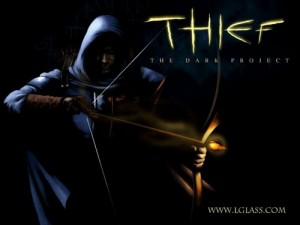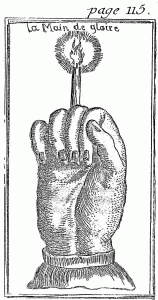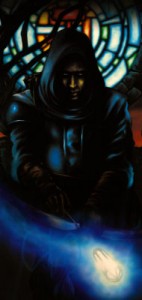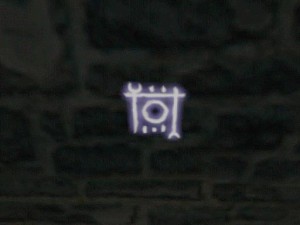
Despite the title of the game Thief, Garrett is more a magician than a rogue, or rather his thievery is a form of magic when successfully enacted by the player. Garret’s training in the monastic order of the Keepers involves abilities to become invisible that border on the supernatural, as well as the acquisition of arcane knowledge, including glyphs of power. The classification of Thief and the associated image of a dimunitive, cowled figure hiding in the shadows derives in part from the thief character class that originates in Dungeons and Dragons as well as the fantasy characters that inspired it, including rogues like Fritz Leiber’s Grey Mouser. Yet, Garrett’s abilities and actions are not constrained to hiding in shadows or backstabbing; he is a quintessential opportunist who does whatever he needs to get the job done. An extra objective available at higher difficulty level in the prison level of Dark Project involves retrieving Garret’s favorite “Hand of Glory.” The Hand is an infamous black magical artifact described in the Petit Albert grimoire as the severed hand of a hanged corpse taken from the gallows and used by cat burglars to evade detection by otherworldy means. As the Petit Albert explains, “The hand of glory [ . . . ] is used by villains thieves to enter houses at night without hindrance.”
In addition to this talismanic magic, Garret plunders magical artifacts and even engages in complex acts of counter-magic as he disrupts the extra-dimensional ritual of the Trickster in the Maw of Chaos or activates the glyphs in Deadly Shadows. It’s not surprising that Garret’s cowl and long flowing robes are equal parts monastic garb and magician’s robe. He is a Master of hiding and the hidden: literally, the occult.
When skillfully guided by a player, Garrett’s magic consists in his ability to “keep silent,” one of the four powers of the sphinx extolled by French occultist Eliphas Levi in The Dogma and Ritual of High Magic. Levi argued that magicians must learn “to know, to dare, to will, and to keep silent,” powers that he attributed to the four elements of classical antiquity (air, water, fire, and earth). To keep silent means literally to maintain the secrecy of the mysteries of initiation, but it can be extended as a metaphorical principle of efficiency and noiseless grace: in other words, stealth. As British occultist Aleister Crowley explains in his Confessions, “to dare must be backed by to will and to know, all three being ruled by to keep silence. Which last means many things, but most of all so to control oneself that every act is done noiselessly; all disturbance means clumsiness or blundering.” A stance of self-controlled noiselessness is the strategic condition of success in Thief and a style of gameplay that activates Garret’s full abilities as an avatar. “Disturbance,” “clumsiness,” and “blundering” are the fail conditions of the Thief series which assure detection and death.
Garret’s apparent physical weakness, signified by hit points sufficient only for a few sword blows from a guard, is counterbalanced by preternatural abilities of stealth. Ordinary mortals risk detection when they hide in shadows, because only the deepest darkness can reliably block out peering eyes. But when a player guides Garrett into shadow and reduces his light gem to pure black, Garrett can vanish, even as a guard walks a few inches beside him. These abilities are built into the game systems of Thief, which rewards ritualistic behaviors of stealth: always tread in the shadows, walk rather than running when possible, extinguish light strategically, and close doors behind you. While we never learn the ultimate essence of Keeper training (which is itself shrouded within the game systems of Thief), our success in Thief depends on our identification with Garrett and his training, which forces us to ask “What Would Garrett Do.”
The merging of stealth and mysticism gives rise to the arcane discipline of the Hassassins in Assassin’s Creed, whose credo “nothing is true, everything is permitted” conceals a mystical insight under the veil of anarchic nihilism: a Neoplatonic belief in the irreality of the sensible world. Altair, like Garrett, “works in shadows to serve the light,” or rather to unwittingly maintain the balance of the Keepers against which he rebelled. Thief teaches the gamers and game designers inspired by it that direct confrontation is often counter-productive, and that the ability to judiciously “keep silent” and move quietly is a higher magic than a carelessly tossed fireball or a poorly chosen word.



